Author Credits:
From the Editor
Father Ed Dillon was among AMEU’s longest-serving and most committed Board members. He gave sage and unvarnished advice, always with a warm chortle. Before he left us (see p. 16, please), we talked about Gaza, truth, and power, and he recalled one of Lewis Carroll’s more macabre characters…:
Humpty Dumpty peered down from his imperial wall at Alice. “When I use a word,” he pontificated, “it means just what I choose it to mean – neither more nor less.”
“The question is,“ said Alice, “whether you can make words mean so many different things.”
“The question is,” said Humpty Dumpty, “which is to be master – that’s all.”
Like so many of us, Father Dillon was shattered by Gaza, by the amoral exercise of power and the doublespeak of the past eight months. He was particularly troubled by the United States’ involvement in conflict with itself: its countenancing genocide with one hand and halfheartedly playing peacemaker with the other, its sending weapons of mass destruction on Monday and building piers to nowhere on Tuesday. Indeed, each day the toll of innocents has grown while the White House mumbles about “laments,” defending slaughter and expending taxpayer-funded energies to confirm that none of the president’s shifting red lines has been crossed.
In this obscene time, Humpty Dumpty would’ve been right at home.
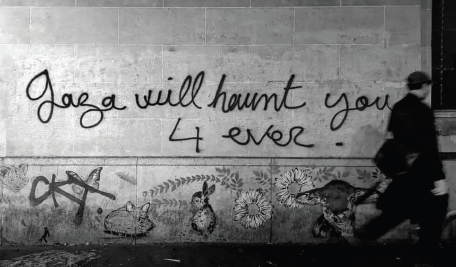
Against such a shameful backdrop, this issue of The Link discussed the response of “the Church” Our takeaway, as is easily gleaned from Sliman Mansour’s powerful cover art, is that across Christian faith traditions, a cowed silence has prevailed. Even as mosques and synagogues writhe and grapple with pain, the silence from American pulpits is noteworthy. Our contributors point out the ever-present fear of the charge of antisemitism, especially in its current hyper-weaponized iteration; even Pope Francis carefully weighs his every utterance, including on Gaza. In some instances, political ideology obstructs understanding; in others, leadership is abdicated, nowhere to be found. All that said, exceptions do exist. Some churches have spoken out forcefully and bravely, in defense of human and civil rights and the US Constitution. The fearless calls for protection and restitution in Gaza by the Rev. Frederick D. Haynes, III, of Friendship-West Baptist Church in Dallas have not gone unnoticed, but neither have been adequately amplified beyond his own pews. Our central spread features the powerful and unapologetic voices of Pastors Allan Aubrey Boesak and Wendell Griffen and their urgent reminder that the time for pious words is over.
Now, as November draws nearer, leaders – clergy and laypersons, matriarchs and presidents, congresswomen and professors – must protect and promote the integrity of our public discourse. The integrity of that discourse will be what determines “which is to be master.” Confronting the ongoing Nakba and halting genocide is central to that process and key to the health of American democracy.
–Nicholas Griffin
Guilt, Theology, Fear, and Racism
Rev. Ashlee Wiest-Laird
On Easter Sunday I met a young woman who was visiting the church I pastor for the first time. As she introduced herself she told me that she had come because she had seen my colleague and me at a Good Friday demonstration against the genocide in Gaza. The large and quite well-known church where she was a member had said nothing from the pulpit about what was happening in Palestine even though in earlier months they had been quite clear about their support for besieged Ukraine. There was only the vague “We pray for peace in the Holy Land” printed in the prayer concerns.
After six months of hoping this would be the week that the atrocities in Gaza would be addressed – only to be repeatedly disappointed – she wrote a letter to the church leadership sharing her anger at their silence and letting them know that she would be seeking a new church.
The truth is that if all American Christians followed this young woman’s lead there would be a lot of empty sanctuaries. Churches in the United States have been alarmingly silent in the face of mass murder. While many spoke out against what Hamas did on October 7, once Israel began its rampant destruction of streets, homes, schools, hospitals, and of course people, the voices stopped. Well, except for Christian Zionists, who want nothing more than for Gaza to be leveled and the West Bank emptied so that their theologically twisted vision of the end of the world can come to pass. Their voices are loud and clear. It is actually the mainline, liberal, and even “progressive” churches that have gone incommunicado when it comes to the violence and death in Gaza. So, why is that? It seems to me that there are at least four intersecting reasons for this silence we are experiencing.
Guilt, theology, fear, and racism.
After World War II there were many Christians of goodwill who felt guilty – and rightly so – about the horrors of the Holocaust and because of this they were eager to support what they believed would offer safety and security to the Jewish people, namely a homeland called Israel. This desire to make things right established what Jewish liberation theology scholar Marc Ellis calls “the ecumenical deal.” In repentance for a couple thousand years of Christian antisemitism, Christians would now support the building of a Jewish ethno-state, and if there were some parts that were, well, difficult or problematic (like ethnically cleansing 750,000 Palestinians who lived on the land), those same Christians would simply look the other way. “After all, shouldn’t the people who have been victimized all this time finally have something that they want?” And for most American Christians it didn’t hurt that the new homeland was halfway around the world, which made it a little bit easier knowing that those Jewish immigrants from Europe weren’t going to live next door.
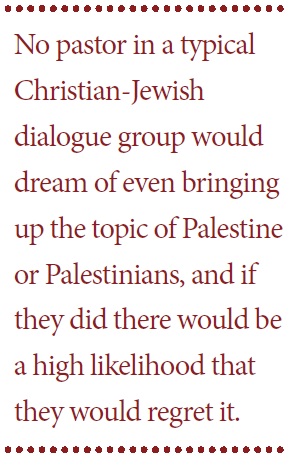
Secondly, Christians, particularly theologians, because of their desire to undo the antisemitism that was so prevalent in Christian theology began to re-emphasize God’s covenant with the Jewish people as a corrective to the tradition of supersessionism, which claimed that Christians had become God’s chosen people in place of Jews. This needed fix to a very discriminatory Christian way of thinking focused attention again on the story of God’s covenant with Abraham as a promise of progeny and land. So, when the state of Israel was founded, open minded, scholarly Christians who would never dream of justifying slavery with the Bible and who were beginning to grapple with their own ongoing racism, sexism, and, later, homophobia, still held on to this idea that somehow that strip of land called historic Palestine actually still rightfully belonged to Jewish people because, well, God said so.
It also then makes sense why none of these well-meaning Christians would want to criticize the state of Israel for fear of being labeled antisemitic. This became even harder as Israel equated Zionism or the movement for a state with Judaism itself and weaponized the use of the term antisemitic a way to silence anyone who calls into question Israel’s founding mythology or actions. No pastor in a typical Christian-Jewish dialogue group would dream of even bringing up the topic of Palestine or Palestinians, and if they did there would be a high likelihood that they would regret it. A clergy friend who had lived in Palestine in the 1970s told me that he brought it up once with a rabbi colleague and was told in no uncertain terms, “You can’t talk about that!”
Just recently Israeli Prime Minister Benjamin Netanyahu spoke with US Republicans about Gaza, saying,
I want to thank you for your support. There’s a long tradition of the American-Israeli alliance. It’s always been necessary, but it’s more necessary now in the face of the barbarism that we face, that threatens our entire civilization… the terror axis of Iran that seeks to put the Middle East back into the Dark Ages and to force a terrible barbarism on us all, really, the Dark Ages…That’s what this conflict is about….
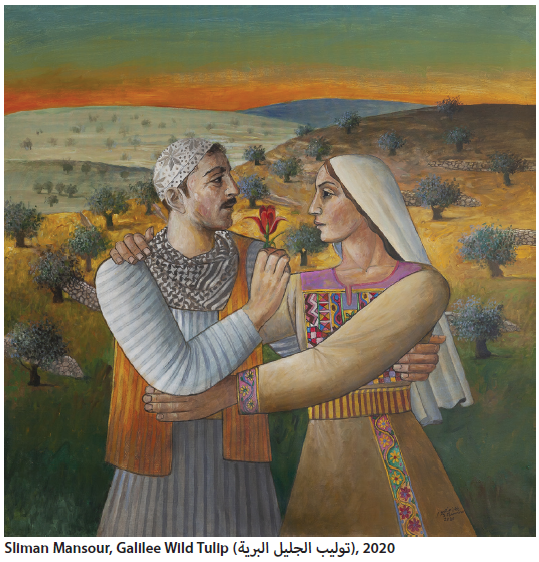
This trope of our moral, enlightened, progressive civilization versus the immoral, irrational, and violent “other” that threatens us is as racist as the day is long. And yet we in the West still have a lot of unpacking to do when it comes to the anti-Arab bias and Islamophobia that we carry around like an invisible backpack.
In his book Orientalism Palestinian thinker and writer Edward Said writes,
If the Arab occupies space enough for attention it is a negative value. He is seen as the disruptor of Israel’s and the West’s existence or in another view of the same thing as a surmountable obstacle to Israel’s creation in 1948…the Palestinian [is portrayed as] either a stupid savage or a negligible quantity, morally and even existentially.
And about Islam he says, “Books and articles are regularly published on Islam and the Arabs that represent absolutely no change over the virulent anti-Islamic polemics of the Middle Ages and the Renaissance. For no other ethnic or religious group is it true that virtually anything can be written or said about it without challenge or demurral.” Said wrote those reflections almost 50 years ago. Perhaps we’ve made some progress, but still Bibi Netanyahu can put the term “barbarism” on repeat with no outcry from political or religious leaders.
Have pastors and churches and bishops and denominations remained silent while Gazans are slaughtered because of some mix of these reasons or simply because they don’t want to be bothered? It’s not always easy to tell and honestly, whatever the reason, the result is the same. Palestinians continue to be dispossessed and killed as if their lives don’t matter, or somehow matter less to God.
Perhaps I’m being too hard on folks. After all, “it’s complicated.” Or maybe good Christians really do feel bad about what’s happening but just don’t know how to respond. And if that’s the case, let me suggest that all those good-hearted believers follow the young woman out of the church building and into the streets with those who are raising their voices on behalf of Palestine. Many of those people used to be in the pews as well but left when the church refused to ordain women or balked at the phrase Black Lives Matter or dismissed the LGBTQIA folks. Or maybe their parents left when the church disparaged Martin Luther King, Jr or supported the war in Vietnam. They got tired of waiting for the institutional church to speak out for justice, to care for the marginalized, to be in solidarity with the oppressed. They decided to look for Jesus. And without question Jesus is in Gaza. Jesus is marching in the streets the world over shouting CEASEFIRE NOW! FREE PALESTINE! If only the church would follow. •
Rev. Ashlee Wiest-Laird is the Senior Pastor of First Baptist Church in Jamaica Plain, MA. She lived in Bethlehem for a year, volunteering at Sabeel Liberation Theology Center and The Middle East Council of Churches in Jerusalem, and currently facilitates learning/solidarity groups to Palestine.
Christian Scholars Reflect on Gaza
Gary Burge, Bruce Fisk, David Crump
If truth is the first casualty of war, a saying often ascribed to Aeschylus, father of Greek tragedy, the second casualty for western evangelical Christians, whenever Israel launches a war on Palestinians, is compassion. Today we wonder where the compassion that should live at the heart of our faith has gone.
Evangelicalism’s theological allegiance to the state of Israel produces solid anti-Palestinian, pro-Israel commitments among the leadership and the rank-and-file of America’s conservative churches whenever these hostilities arise. Russell Moore, general editor of Christianity Today, American evangelicalism’s flagship publication, asserts that “American Christians should stand with Israel under attack” without reservation. Moore insists that those who have “moral clarity” will endorse Israel’s current assault against Gaza and protect Israel at all costs.
Certainly, the murder and kidnapping of over 1,200 Israelis on October 7, 2023 demands international condemnation. The Hamas attack against men, women, and children in southern Israel was an act of terrorism. Holding civilian hostages is a war crime. No one should dilute this judgment.
And yet, Israel’s excessive response to the October 7 attack has been an outrageous example of state-sponsored terrorism. At the time of writing over 32,000 Palestinians have been killed by the Israeli military, over one third of them children. Seventy three thousand have been wounded. Famine and disease are spreading throughout northern Gaza where over 30 children have already died of starvation. Oxfam International, in a March 15, 2024 report, puts the number of Gazans at risk of famine at 75 percent.
The public spokesman of UNICEF said recently from Gaza that he has never seen anything like what Israel has done. He has seen catastrophes from the Congo to Afghanistan, and he is in shock.
John Elder, a career diplomat with UNICEF, has described the violence to children in detail: “I’ve never seen the sheer number of children with wounds of war…it’s shrapnel, and it’s often ripping through a body. It’s burns, horrendous burns, on children and broken bones.”
The International Court of Justice (ICJ) has ruled it plausible that Israel’s acts could amount to genocide in Gaza and has ordered Israel to take “all measures within its power” to prevent genocide. Since that ruling, things have only gotten worse.
When Israeli defense minister Yoav Gallant pledged, “We will destroy everything,” he wasn’t kidding. Gaza has been so thoroughly bombed that Gazans have nowhere to go for safety. Even designated “safe zones” have been bombed. Over 100 journalists have been killed. All infrastructure has collapsed. Two thirds of hospitals and more than 80 percent of health clinics are completely nonfunctional. Every university lies in rubble. Power plants and water treatment facilities were among the first to be targeted. Destroyed are a quarter of Gaza’s greenhouses and 40 percent of croplands. No Gazans are fishing.
Relief convoys entering Gaza are severely limited. About 100 trucks entered Gaza per day in February, which is 20 percent of the number entering before October 7. Philippe Lazzarini, head of the UN relief agency, reports that Israeli inspectors block emergency supplies like incubators and ventilators. Also blocked are Oxfam’s water testing kits. Israeli civilians bring their children to form barricades preventing relief from gaining entrance, while Palestinian children die of starvation on the opposite side of the fence.
This is all enormously distressing to us who have spent much of our careers working among Israelis and Palestinians. Our friends on both sides are deeply traumatized. But the suffering, the unfolding massacre we are witnessing in Gaza, is like nothing we’ve seen or imagined in our combined 65 years of experience in the Holy Land.
When an Israeli sniper shoots two Christian women outside Holy Family Catholic Church on October 16 – just for walking out the front door to use the bathroom – we should be outraged. When Israeli tanks fire directly on the church’s Mother of Teresa Charity nearby, filled with 54 disabled guests, we should decry the savagery. Seven more Christians were shot in the church grounds.
When Israel bombed St. Porphyrius Orthodox Church on October 19, many Christians died. Evangelical families packed into the Gaza Baptist church expected a similar fate. One of the teens used WhatsApp to tell an American friend, “We have no food and we are out of water. This is my church – and if I must die, I will die here.” On February 29, a convoy of 18 aid trucks entered Gaza and was swarmed by a famished mob grasping for food. Nearby Israeli military opened fire. One hundred eighteen people were killed and 760 were seriously injured. Israeli behavior was documented by a wide-ranging list of journalists and witnesses including UN observers, who undermined Israel’s claims that people died in a stampede or were run over by the trucks, and that soldiers were firing in self-defense. Area hospitals reported that 80 percent of the victims died of gunshot wounds.
We cannot ignore these stories. We need to look into the faces of these victims of violence. This is not “collateral damage.” This is murder. The UN called the “flour massacre” just that: a massacre. David Cameron, the UK foreign minister, called it “horrific.”
But something else troubles us. The response of American Christians. Thousands of us, rather than calling for the killing to stop, clamored into the Washington Mall last November and, at the prompting of politicians and pastors, chanted “no ceasefire.” This crowd of some 100,000 Christians wanted more bombing, more killing, more horror. San Antonio pastor John Hagee announced that any Israeli/Palestinian peace deal would be the work of the antichrist. The scene in Washington, witnessed around the world, confirmed for many that America’s Christians have lost their moral compass.
We cannot imagine Jesus chanting “no ceasefire” as babies are pulled from the rubble.
On February 19, the evangelical magazine Christianity Today published a cover story by Mike Cosper that tries to explain the events of October 7 for evangelical readers. And it has aroused a fury of concern throughout the country. “The Evil Ideas Behind October 7” rightly identifies the ideology of hate that drives Hamas. But as reviewer Ben Nordquist has shown, the essay itself is an ideological screed. It offers no historical context for Palestinian anger, it repeats discredited claims about mass rape and sexual mutilation, it doesn’t question Israel’s claims to be providing humanitarian corridors and working to minimize civilian casualties, and it lumps critics of Israel and Palestinians together with Hamas and the Nazis. Meanwhile, Cosper completely ignores Israel’s own ideology of violence, downplays the surging influence of rightwing extremists in its government, reduces Israel’s genocidal response to “details” and “tactics,” and utters no condemnation, only lament, over the suffering. The story here is not just that Cosper’s essay is poorly researched, but that evangelicalism’s flagship magazine has dedicated its cover to promoting a deeply prejudicial, flawed, and increasingly genocidal narrative.
Hamas terrorism must stop. But Israel’s retaliation has terrorized over two million Gazan civilians. Roughly 70 percent of the dead are women and children.
Where are the pastors and lay leaders in our churches who dare to speak truth to power during this genocide? Where are the readers of Christianity Today who will critique skewed reporting such as this?
In 1940s Germany, in 1960s America, Christians were afraid to speak up in times of war. Today we all celebrate the courage of Bonhoeffer and Niemöller. But silence, fear, and assent to state terror have been the more common evangelical response.
We beg the church and its leaders not simply to stand with Israel but to stand with the people of Gaza, as well. We call American Christians, Israel’s most visible ally in the Western world, to refuse to reduce Gaza’s Palestinians to mere collateral damage, and to recognize that indiscriminate killing will not make Israeli Jews safe.
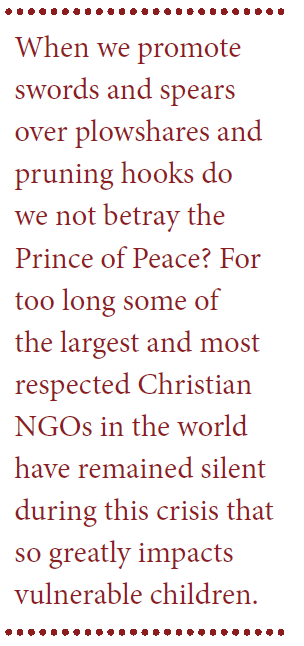
What American evangelicals say matters. When we promote swords and spears over plowshares and pruning hooks do we not betray the Prince of Peace? For too long some of the largest and most respected Christian NGOs in the world have remained silent during this crisis that so greatly impacts vulnerable children. World Vision US, for example, the world’s largest Christian humanitarian organization, working in 100 countries, prides itself in saying that they go where no one else goes because “Jesus is alive in the hardest places to be a child.” Founder Bob Pierce is fond of saying, “Let our hearts be broken by the things that break the heart of God.” Yet World Vision was conspicuously absent from the February 28, 2024 joint op-ed by CARE, MercyCorps, Oxfam, Save the Children, and others calling for a ceasefire in Gaza. Finally, six months into the war, World Vision has at last spoken out about the horrors of this massacre on children, though the statement refuses to name who is doing the killing. To know real people is to banish false stereotypes. Our friends in Palestine are generous, kind, and hopeful, but exhausted by the conflict and displacement they have suffered through for the past 75 years. We need courageous Christians who will challenge the warring demagogues whose voices are dominating our media and subverting the Gospel of Christ. We are the church. We are citizens of the kingdom of God. We follow Jesus. That means we care for outcasts and protect the vulnerable. Surely that includes Israeli hostages and 2.3 million displaced and starving Gazans. •
Drs. Gary Burge (Wheaton College), Bruce Fisk (Westmont College), and David Crump (Calvin University) have had long careers in Christian higher education as theologians.
The Time for Pious Words is Over
Breaking silence about the hateful faith of US-Israeli Zionism, settler colonialism, apartheid, white supremacy, xenophobia, and violence against Palestinians in the “Holy Land”
Allan Aubrey Boesak and Wendell Griffen
The United States government has invested over $150 billion in foreign aid to Israel since 1948. Israel has used that money to arm its military and depopulate indigenous Palestinians, subsidize and defend Zionist Christian and Jewish settler colonies, and fund state-sponsored assaults against Palestinians in Jerusalem, the Israeli occupied West Bank, and Gaza.
Nearly 30,000 Palestinians, most of them unarmed and defenseless women and children, have been killed by Israeli assaults in Gaza since October 7, 2023. Countless other persons are buried under the rubble of demolished churches, mosques, synagogues, residential dwellings, hospitals, schools, and other structures because of Israeli attacks against Gaza. Meanwhile, the United States has voted on three occasions in the UN Security Council to veto resolutions calling for an immediate bilateral ceasefire and provision of humanitarian aid to besieged and defenseless Palestinians.
We are liberation theologians in the religion of Jesus, activists for peace and justice, and faith leaders to people who have deep painful knowledge about the ways the “Hateful Faithful” hijack the gospel of Jesus and fraudulently use Christian identity to disguise white supremacy, Anglo-European paternalism, bigotry, discrimination, militarized authoritarianism, greed, and lust for empire. Separately and together, we have written and spoken publicly on numerous occasions about the Israeli-Palestinian conflict. We do so again now, as the world is aghast about the ongoing genocide in Gaza due to US/Jewish Zionism, white supremacy, racism, Anglo-European imperialism, settler colonialism, apartheid, genocide, and xenophobia.
We call on prophetic people to take the following positions.
1. Deplore, denounce, and condemn United States diplomatic, economic, military, and other support to and funding for the apartheid State of Israel from its inception.
2. Call for the immediate end to all US governmental aid to Israel.
3. Demand that the United States support a resolution in the United Nations Security Council calling for an immediate bilateral unconditional ceasefire by all parties to the ongoing Israeli war against Palestinians in Gaza, the West Bank, and East Jerusalem, and for the safe unconditional release and return of all hostages held by Hamas and Israel.
4. Demand that funding be immediately restored to the United Nations Relief and Works Agency for Palestine Refugees in the Near East (UNRWA) for humanitarian assistance and welfare relief for displaced Palestinian refugees from Gaza, the Israeli-occupied West Bank, and East Jerusalem.
5. Demand that the United States withdraw its opposition to the Petition of the Republic of South Africa, which accuses the State of Israel with genocide against the Palestinian population of Gaza.
6. Demand that the United States formally recognize Palestine as an independent state and support the admission of Palestine as a free and independent sovereign state before the United Nations.
7. Conditioned on acceptance by and cooperation from indigenous leaders from the State of Palestine, and as reparations for almost a century of Zionist-inspired and US funded and outfitted white supremacist violence against Palestinians and other persons of African descent in Palestine and Gaza, we should demand that the United Nations establish and administer a temporary diplomatic, security, economic, and cultural presence in Palestine tasked with the following mission:
(i) to support the right of Palestinians to sovereignty, security, restoration, and return to their homes, villages, and neighborhoods;
(ii) to coordinate the safe release, recovery, and return of all persons who are detained or otherwise held hostage by Hamas and the Israeli regime; and
(iii) to cooperate in demanding, procuring, and distributing reparations to the free and independent State of Palestine in an amount equal to the monetary value of all funding, weapons, munitions, other materiel support, and diplomatic support provided to Israel by the United States, United Kingdom, Germany, and other nations during its almost 76-year scheme of settler colonialism, white supremacy, Christian and Jewish Zionism, mass murder, and land and mineral theft from the Jordan River to the Mediterranean Sea.
8. Demand that the Israeli regime immediately thereafter withdraw all civilian, military, and intelligence security personnel and forces from East Jerusalem, the occupied West Bank, and Gaza, and that the United Nations supply a security force, with the advice and consent of the State of Palestine, to ensure the security of Palestine and protect Palestinians from settler and other Israeli-US sponsored and subsidized violence.
9. Demand that the United States and Israel be prosecuted in the International Court of Justice for mass murder, starvation, land theft, depopulation, genocide, atrocities, unlawful detainment, and other war crimes committed against Palestinians in Gaza, the Occupied West Bank Territories, and East Jerusalem.
US President Joe Biden should remember that another US president who worshipped the gods of bloodlust, imperialism, domination, and subjugation of indigenous people suffered damage to his legacy. Despite his success in securing passage of the landmark Civil Rights Act of 1964 and the Voting Rights Act of 1965, by 1968, public disgust surrounding US atrocities and warfare in Vietnam, Cambodia, and Laos forced Lyndon Johnson to abandon efforts for reelection and ended his political career.
Similarly, people who care about love, justice, and peace are disgusted by US complicity in Israeli oppression against Palestinians. The wrongs we see are not just happening; they are caused to happen, and they are happening to…God’s children who are vulnerable, targeted, and excluded from human consideration. They are not happening randomly, they are deeply systemic, deliberately built into systems of oppression, domination, and dehumanization. And we must not be afraid to say it.
Assertions that the divine imperatives of love, justice, hospitality, generosity, and peace are being followed by people who condone racist bigotry, white supremacy, settler colonialism, land and mineral theft, depopulation, genocide, apartheid, and mistreatment of vulnerable persons are worse than specious. Those claims amount to moral and ethical nonsense.
Thus, we refuse to conceal our disgust about the hateful faith responsible for the orgy of Israeli violence that is killing, poisoning, starving, scarring, and destroying Palestinians.
We are disgusted by the Biden administration’s complicity in starvation, mass murders, collective punishment, destruction of housing, and calculated assaults on life support and infrastructure systems in Gaza, the West Bank, and East Jerusalem.
Our disgust grows minute by minute as we and the rest of the world view live footage of starving, dismembered, unhoused, sickened, and grief-torn Palestinian men, women, and children.
We will not betray the gospel of Jesus and become counselors to, and cheerleaders for, the US and Israeli enterprise that is murdering, maiming, looting, poisoning, tormenting, and terrorizing our siblings in the family of God in Gaza, the occupied West Bank, and East Jerusalem.
The time for pious words is over. •
Rev Allan Aubrey Boesak is a cleric in the South African Dutch Reformed Church, and a leading scholar and theologian during the dismantling of apartheid in South Africa. Rev Wendell Griffen is a retired Arkansas state court judge, a leading public intellectual and a pastor in Little Rock. He blogs at Justice is a Verb!
The Church of England’s Complicity in the Gaza Genocide
Stephen Sizer
In his 2023 Christmas sermon “Christ under the Rubble,” the Reverend Dr. Munther Isaac insisted, “Gaza today has become the moral compass of the world.” Lamentably, many Christian leaders in the US and Europe have stood by, silent and complicit, unwilling to criticize Israel for what is increasingly recognized as a genocidal campaign against the Palestinian people.
This article analyzes official statements of the Church of England concerning Gaza since October 7, 2023 to discern whether it has indeed lost its moral compass. These statements display a consistent disregard for the historical context of the outbreak from Gaza, namely 75 years of Israeli military occupation of the West Bank and Gaza Strip and settler colonial violence. The statements studiously avoid using terms such as “apartheid,” “genocide,” “ethnic cleansing,” or “war crimes,” and fail to acknowledge Israel’s obligations as an occupying power. (The church’s statements also fail to recognize the rights of self defense of those living under occupation, including the right to resist occupiers by force.)
The Archbishop of Canterbury: Whitewashing Genocide
Just as the Hamas breakout of Gaza on October 7 did not happen in a vacuum, so too is there a decades long context for the anemic response of the Church of England. The Archbishop of Canterbury Justin Welby’s speech at the “Embrace the Middle East” conference in September 2023 on reconciliation in the region demonstrates the bias therein. Several people attending criticized his presentation’s denial of Israeli apartheid. Chair of the Jewish Network for Palestine David Cannon, for one, observed in the Church Times, “Welby’s refusal to use the term apartheid was specifically contradicted by the two other speakers. Welby’s weasel words were utterly shameful in the face of so much evidence provided by Amnesty International, Human Rights Watch and B’Tselem.”
Two days after October 7 Archbishop Welby wrote to the CEO of the Board of Deputies of British Jews, Michael Wegier, to express his “deep sense of solidarity.” In the letter he wrote, “If there is anything you wish to ask of me that may be helpful, do not hesitate to do so. Please convey these sentiments to those in Israel who you will be meeting…” This likely explains why the archbishop made a visit to Israel two weeks later to meet relatives of those killed or taken hostage. Since then the archbishop does not appear to have written any similar letters to leaders of the Palestinian community in the UK or church leaders in Palestine.
During his visit to Israel, Archbishop Welby’s comments occasionally went beyond merely endorsing an Israeli perspective through the use of inflammatory language. For example, in an October 22 Times of Israel article titled, “Archbishop of Canterbury: Accusing Israel of Hospital Blast is ‘Blood Libel,’” the archbishop denounced the Hamas attack as “evil” and did not acknowledge the context, instead suggesting, “This is like a volcano breaking out, it is evil in its most extreme form.” The bombing of the Ahli Anglican Hospital in Gaza had occurred a few days before. Archbishop Welby maintained that there was no reason to assume that Israel was responsible, arguing that spreading such an accusation was a “blood libel.” Reuters also covered the story, pointing out that “blood libel” is a term historically used for false accusations of atrocities committed by Jews that sometimes fuelled violent antisemitism and pogroms against Jewish people.
Facing criticism for invoking “blood libel,” he later issued an apology, saying,
I regret the use of the phrase ‘blood libel’ in that interview…I was attempting to articulate that many Jewish people are deeply conscious of a long history of accusations that trace back to the darkest times of their history. That must be borne in mind when we respond to events in Israel, Gaza, and the West Bank. Especially here in Europe, the vast increase of the profound wickedness of antisemitism must be resisted, and that must involve being aware of that history.
Though apologizing, the archbishop justified his use of the term “blood libel” given that “the profound wickedness of antisemitism must be resisted.” Moreover, the archbishop has subsequently made no mention of the fact that Israel has targeted and destroyed virtually every other hospital and medical facility in Gaza.
Further, after the archbishop initially refused to meet with Dr. Munther Isaac, a Zoom meeting between the two men took place on March 7, 2024. Clearly influenced by their conversation, Archbishop Welby made his most outspoken criticisms of Israel, though he still avoided using terms such as “genocide,” “war crimes,” or “ethnic cleansing:” “I was grateful to speak with my brother in Christ, the Rev Dr Munther Isaac, earlier today. In listening to him, I continue to be deeply horrified by Israel’s bombardment and siege of Gaza. I condemn the killing of Palestinian civilians…”
Dr. Isaac replied, urging “all church leaders to pressure their governments to put an end to this genocide.” While now willing to engage with Dr. Isaac, the archbishop was nevertheless still not willing to describe Israel’s actions as “genocide” nor heed Dr. Isaac’s insistence that he pressure the UK government to end it.
The House of Bishops: Reciting Hasbara
On October 31, 2023 the House of Bishops issued a “joint statement” that seemed lifted from an official Israeli press release:
As Bishops of the Church of England we condemn the terrorist actions of Hamas on October 7. Hamas has killed civilians without mercy, defiled their bodies, treated the most vulnerable brutally and taken hostages. Its continued indiscriminate rocket attacks against Israeli targets puts civilian structures and individuals at risk. All this is built on its denial of the right of Israel to exist. Hamas has oppressed the people it was originally elected to serve and has put them in harm’s way by using them as human shields.
In its use of the phrase “denial of the right of Israel to exist,” the statement implies that Hamas advocates the killing of Jews because they are Jews. Although the term “Jews’” and “Zionists” are often used interchangeably in the Hamas 1988 charter (as they often are intentionally by Israel), the charter makes clear that “under the wing of Islam followers of all religions can coexist in security and safety.” Significantly, and the bishops should have known this, the charter was revised in 2017. Article 16 explicitly states, “Hamas affirms that its conflict is with the Zionist project, not with the Jews because of their religion. Hamas does not wage a struggle against the Jews because they are Jewish but wages a struggle against the Zionists who occupy Palestine.”
The bishops’ allegation that the high casualty rate in Gaza is due to Hamas using civilians as human shields is regularly made by Israel. However, human rights organizations monitoring the situation in Gaza have repeatedly refuted this allegation. For instance, in 2008 and in 2014, Amnesty International, Human Rights Watch, and the UN all found no evidence that Hamas was deliberately using civilians as human shields. However, they did find evidence that Israel had used Palestinian civilians as human shields.
In their closing appeal, the bishops call upon “Hamas to release all hostages unconditionally and unharmed” while neither demanding that Israel also release the thousands of Gazans held hostage in administrative detention since October 7 nor committing the parties to the conflict to a ceasefire. Rather, the bishops call for “[i]mmediate humanitarian pauses that will enable the wounded and the most vulnerable to be evacuated under ICRC or UN supervision, holding out hope for a ceasefire in the longer term.” Presumably this was because, believing in Israel’s right to self-defense, they were convinced that a permanent ceasefire would only be possible after the defeat of Hamas.
The House of Bishops published a second statement in December 2023 with an emphasis on children who had suffered. However, the disproportionate deaths of Palestinian children were put in the context of Israel “exercising its right to self-defense.” And whereas the number of Israeli children’s deaths was listed (33), Palestinian children were only “reportedly killed” and were given as a percentage (over 40 percent of 18,000), leaving the reader to calculate the actual number.
The bishops offer a mild criticism of Israel’s devastating bombardment and siege of Gaza, insisting it cannot be “morally justified.” Yet this is prefaced by a reaffirmation of their statement of October 31 that “there is no equivalence between the atrocities of Hamas against Israeli civilians, and the right and duty of Israel to defend itself.”
Despite nearly three months of mounting evidence, well-briefed Christian leaders were still refusing to use legal terms such as “genocide,” “war crimes,” or “ethnic cleansing” to refer to Israel’s destruction of Gaza, in stark contrast to the UN, Amnesty International, and other human rights organizations, which had all been doing so since October. Instead, their statement uses terms such as “war” and “battle,” suggesting two opposing and equal forces, which was leading to a “human catastrophe.”
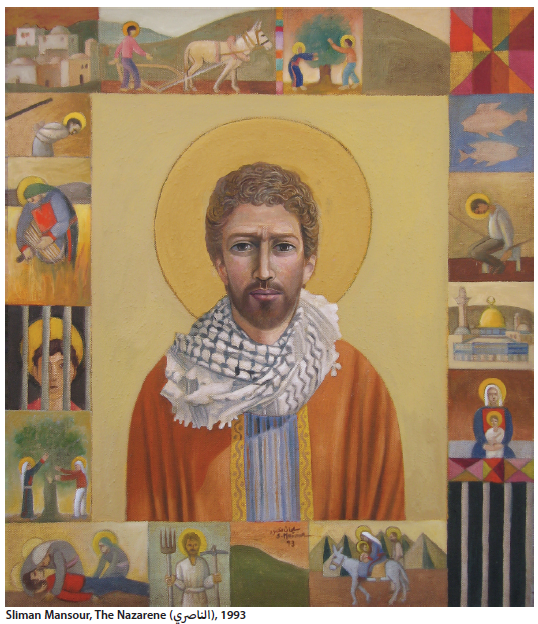
The House of Bishops then issued another, much shorter, statement on February 13, 2024: “The relentless bombardment of Gaza and its huge cost in civilian lives and civilian infrastructure must stop. The manner in which this war is being prosecuted cannot be morally justified. We urge Israel to adhere to the ICJ order and to ensure that Palestinians have access to food, water, healthcare, and safety, that have long been denied to them.”
While referring to the “ICJ order,” the bishops avoid using the term “genocide,” which was the basis of that order. Furthermore, their statement continued to affirm Israel’s “right to self-defense” and supported the British Foreign Secretary’s call for an “immediate pause in the fighting,” suggesting they were still only supporting a temporary ceasefire or pause rather than a permanent ceasefire.
Conclusion: For the Love of God, This War Must Stop
A senior Anglican bishop, the Right Revd Christopher Chessun, the Bishop of Southwark and member of the House of Lords, finally broke ranks in March 2024. His condemnation of Israel for having crossed “red lines” in bombing hospitals and its “brutal and uninhibited collective punishment of the Palestinian people” was unprecedented, language that was entirely absent from the previous three House of Bishops’ statements and from those of the archbishop. Instead of calling for a temporary pause or ceasefire, Bishop Chessun insisted, more than once, for an end to the war: “For the love of God, this war must stop… and it must stop now…By steadfastly refusing to suspend its weapons sales, the British government has brought shame upon us all.” Moreover, for the first time an Anglican Bishop used the word “genocide” and referred to the charges Israel must answer before the International Court of Justice.
It will be significant to observe whether, in any future statements by the House of Bishops, they follow Bishop Chessun’s lead or continue to bring shame on the Church of England. Indeed, if Gaza is the moral compass of the world, the Church of England leadership have yet to find theirs. •
Dr. Stephen Sizer is the founder and director of the registered charity Peacemaker Trust and the director of the forthcoming Institute for the Study of Christian Zionism. This piece has been adapted from “The Church of England’s Complicity in the Gaza Genocide,” found on Dr. Sizer’s website at https://www.stephensizer.com/2024/05/the-church-of-england-and-gaza/.
After the Gaza War
H.E. Patriarch (Emeritus) Michel Sabbah
In Gaza today, there is war. It’s been already six months. Thousands of victims, and ruins throughout Gaza. It seems that we are at the last phase, in Rafah, a border town with Egypt, where a million and a half people, refugees and locals, have gathered. After that, there will be no one left to kill.
In Gaza, there have been several wars. Israel says this war will be the last. But until now there are human victims and ruins, like never before, and peace does not seem to be near. Victims, human sufferings are so many. More than suffering, more than the loss of men and women, children and babies, humanity is lost.
Why the war in Gaza? The immediate cause is the Hamas attack on October 7, 2023. But the direct cause is also the permanent siege imposed on all Gaza territory since 2007, since the Hamas political party has governed the Gaza enclave. Since then, the entire territory, two and a half million people over an area of 380 square kilometers, has been under total military siege, imposed by Israel, except for the necessary humanitarian aid.
But the real permanent cause is also the deep forgotten roots: the conflict between Israelis and Palestinians, begun in 1948, to which Israel has never been able to put an end with a peace agreement, and that the international community seems to have forgotten.
The deep roots are: Gaza under siege, and all of Palestine, towns and villages, subject to Israeli military occupation. Hundreds of deaths over the years, thousands of political prisoners, demolished houses, military checkpoints on all roads, disrupting freedom of movement and daily life, and a paralyzed, dependent Palestinian economy. In short, we are in a permanent state of war. In this state all the wars in Gaza take root, including that of October 7. And more will come, despite the useless inhuman violence of the present war, if a just, lasting peace is not reached between the two peoples.
The present Gaza war is the first in intensity, in ruins, in number of victims, and also the first to awaken the world’s attention to a forgotten conflict.
The Gaza War Today says: War must stop without further delay, because it is no longer a war. It’s a massacre. What after the war?
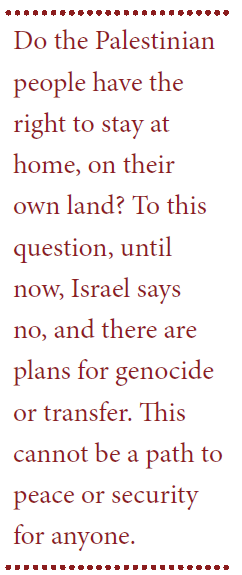
This time, Israel must win the battle for peace. Otherwise, it will remain an unnecessary defeat for all. It is time for the forgotten conflict to be put back on the agenda, and for the international community to take responsibility and build this peace, which has seemed impossible until today.
Peace means: the security of Israel and, at the same time, the security of the Palestinian people, whose only wrong is to be at home, on their land, in their towns and villages. In fact, the fundamental question that arises today is the following: Do the Palestinian people have the right to stay at home, on their own land? To this question, until now, Israel says no, and there are plans for genocide or transfer. This cannot be a path to peace or security for anyone.
To achieve peace, we must simply admit that even in this conflict, human beings are equal. Israelis and Palestinians, equally created by God, in the image of God, capable of loving, not killing. On this holy land, there is also room for both peoples, with the same political rights: two states, each at home, independent, free, each capable of loving, not of returning to resistance or war. For this, a new education is necessary. We have experienced war for decades; we now need a new education that makes both peoples capable of building and living in peace. The leaders and the people also need to be re-educated.
Who is responsible for building this peace? First, the two peoples themselves, Israeli and Palestinian. Then the international community, the friends of Israel and Palestine. The true friends of Israel are those who help Israel achieve peace. Stronger in arms, to win wars, and remain insecure, is not friendship, nor true help to Israel.
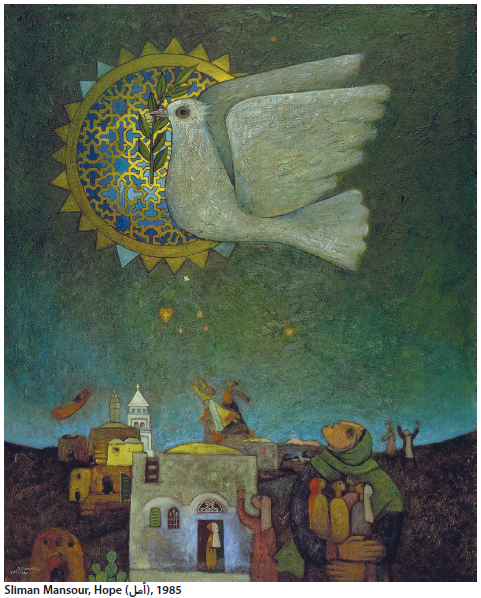
One can ask the question: Are the two peoples capable of living in peace, each in their own state? Why not? There is too much suffering and injustice in memory, that is true, but there is also the will to live, and there is the fundamental goodness that God has placed in everyone. God created the human being capable of life, not of death, capable of love, not of killing.
The surest path to peace is peace with the enemy, especially when the two enemies share the same land. So, for Israel, peace is made first with the Palestinian people, then with all the regimes in the region. Peace with all the regimes in the region, what has been called the “Abrahamic alliance,” and maintaining hostilities with the Palestinian people, does not ensure peace. First peace at home, then with the neighbors. It should also be noted that peace with the regimes of the region is not peace with the peoples of the region. People remain enemies, even with peace treaties between regimes. Peace with the peoples of the region will come when peace is made with the Palestinian people. The strength of the World Powers can impose de facto situations and injustices, but it does not make the strength of the oppressed weak disappear, as has been seen until now.
Therefore, the international community must finally take the necessary steps to end the conflict between Israel and the Palestinian people and end the 1948 war with a peace treaty between the two peoples.
The Churches can and must help. It is their responsibility also. Pray, raise your voice, and act. The Holy Land is the entire Holy Land, it is the two peoples, Israeli and Palestinian, and the Christian community there is part of the two peoples. Everyone needs peace. You can help them. Christ came to bring peace to the world, and to his Holy Land too. The Church still has the same mission today.
Jerusalem, March 21, 2024 •
Archbishop Michel Sabbah is Latin Patriarch-Emeritus, Roman Catholic Diocese of Jerusalem, for Holy Land-Palestine, Israel, Jordan & Cyprus. Born in Nazareth in 1933, he was the first native Palestinian appointed by the Vatican to that office, and served from 1987-2008. He is also past president of Bethlehem University, co-author of the Kairos Palestine Document, and past co-president of Pax Christi International as ardent advocate for peace, justice, non-violence and inter-religious dialogue based on a “logic of love” respecting all human beings.
About the Artist
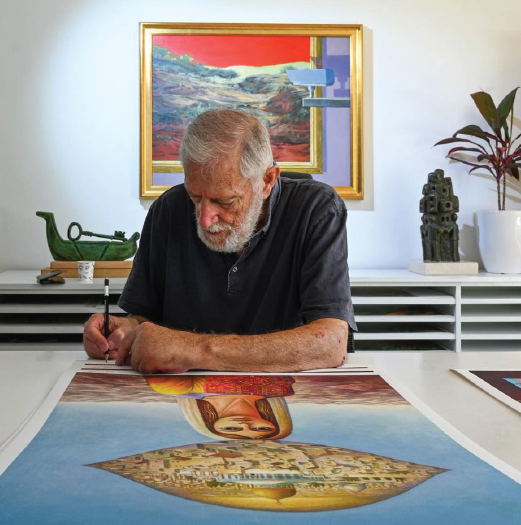
Palestinian artist Sliman Mansour, whose artwork graces this issue, exemplifies the myriad ways that Palestinian artists draw from their collective past to illustrate their present lives. Mansour’s work probes the symbols and icons of Palestine – religious, cultural, and political – melding them with the context of Palestinian life today. His work tells stories. When he paints Jerusalem or the Holy Family, the images express more than just that subject. They also reflect the ways that Palestinians connect to Jerusalem or how families experience injustice and maintain dignity amidst the Israeli occupation. His painting of a haloed Palestinian man in a kufiya, The Nazarene, is framed by images of the challenges he faces navigating an oppressive regime, drawing in title and imagery directly from Christian icons of Jesus and the stations of the cross. Mansour’s vision of Palestine’s history wedded to contemporary images, colors, and media and his public engagement through his art, writing, and institution-building has made him not only one of the most well-known Palestinian artists, but also a source of some of the most popular Palestinian imagery and artwork today.
— Prof. Rochelle Davis, Sultanate of Oman Chair, Georgetown University
In Dedication: Father Edward J. Dillon (1936-2024)
Several months since his passing, we continue to grieve the loss of AMEU Board member, Father Ed Dillon.
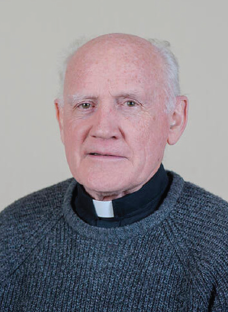
Born on New Year’s Day in 1936 in upstate New York, Ed died unexpectedly this past January from complications of pneumonia. He was in the company of close friends in the beautiful rolling hills of Maryland. He was 88 years old.
Ed’s warmth enveloped all who drew near. His homily was delivered with aplomb, and his laugh rumbled up from a deep well. Even with failing eyesight in later years, he never missed a beat, whether about film, liturgy, the beauty of the dawn, or the moral urgency of the Palestinian cause. The son of Matthew F. and Kathryn O’Keefe Dillon, he completed studies in sacred theology at Rome’s Pontifical North American College and was ordained in Rome just shy of his twenty-fifth birthday. From his earliest days as a priest, Father Dillon’s calling took him deep into the recesses of hardscrabble 1970s America, and he spent decades in and around Philadelphia, ministering to the unhoused and working with prisoners and returning citizens.
When Ed joined AMEU in the early 1980s, he was a cornerstone in our efforts to show Americans on the ground realities in the Middle East, leading numerous witness tours in Palestine, Jordan, Israel, and beyond. He wrote several articles for The Link, always original and unsparingly honest. In 1983 he followed on the heels of the Israeli invasion of Lebanon and the horrific violence that had occurred when he chronicled the circumstances of Palestinian and Lebanese prisoners being held in Israel. That issue is available in our archives and demonstrates Father Dillon’s prophetic candor, equal parts sober, true, and wise. Across our nearly sixty years, it is one of the very best pieces we’ve published.
Ed Dillon was an exceptional human being, and we are grateful to have broken bread with him. Requiescat in pace.
